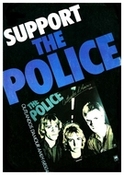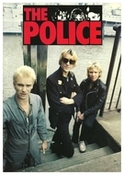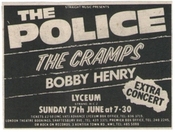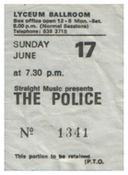
The Police, The Cramps and Bobby Henry at the Lyceum...
There are various ways of revitalising old-fashioned rock music. Three of them are playing the Lyceum.
Bobby Henry opens the bill with an encouraging but inconsistent set. Firmly rooted in '60s rock, he showers arrangements with all the components that ought to make them varied (and contemporary) - brazen dischords, well-timed hooks, disconcerting solos and occasional-stumbling rhythms - but ultimately you can't remember a single one of his melodies. He has confidence, a decent band and a very powerful voice, and will hopefully write some songs to match.
Deliberately I assume, the Lyceum sliding roof rolls back to admit a ghoulish half-light as the grotesque Cramps stumble out under the sick green sidelamps.
They epitomise the disposable New York garage formula of slamming together a bizarre extremes in the name of instant novelty, and then jetting into the headlines as fast as they'll fade into obscurity. Their lifespan is measured in minutes - minutes to be savoured.
They are the magnetically dumb Ivy Rorschach on guitar; the suave, automaton Mick Fox 9drums); the high priest of inane vampire camp, Bryan Gregory on polka-dot flying V; and the seamy, frenetic Lux Interior on tremolo pastiche vocals.
The noise they make is a thick blanket of bassless distortion, tinged with acid off-key sub-Duane Eddy solos and hauled over a lumpy tom-tom beat plus cymbals. It's swiftly reviewed by a consensus below stage, given the universal thumbs down and greeted with a hail of phlegm and sprayed lager.
The set lurches towards disruption, with a hideously flecked Bryan Gregory threatening his assailants while the gob visibly thickens to his every duff note.
Sympathy and helpless laughter cloud the memory, but highpoints were a classic rendition of Jack Scott's 'Way I Walk', and the sight of Lux being dragged squirming from the crowd in the convulsive climax to 'I Was A Teenage Werewolf'. Farewell Cramps, it's been a sweet romance.
The Police pitch against this shameless mayhem with a show that's suspiciously routine and professional. It seems the nine months of ceaseless slog that have suddenly shot them into the limelight have also denied them the chance to expand their material accordingly.
Their prime assets - Sting's domineering high-register and the band's acute sense of brisk percussive dub/rock - are stretched to unjustified limits to pad out a short and transparently overworked set.
What hits on record is the tension and precision they compress into each sparse four minute package. On stage, they deflate almost every number with tired sections of boogie while Sting explores his echo chamber, and some (notably the ransacked 'Roxanne') have already been tailored for mass audience lead vocal.
Behind all this it's still obvious (and frustrating) that The Police are quite exceptionally competent. Stewart Copeland keeps the drumming clean, sharp and meticulous, the severely underused Andy Summers complements with graphic rhythm guitar, and Sting's bass is effortless, exact and sometime (as in 'Hole In My Life') surprisingly ambitious. Between them, they leave just enough slack to sound spontaneous.
With these near-perfect criteria, it makes little sense that they lean so heavily on what they invert within the standard rock trio format - soft centred, self-pitiful lyrics and instrumentals that attempt to seduce rather than assault. The new single 'Message In A Bottle' points them even further in that direction.
When they've sifted through their old songs, installed some new ones and put together a tighter set, The Police will deserve the kind of success they've already achieved.
It's not more than a matter of time.
(c) New Musical Express by Mark Ellen
Police, Cramps and Bobby Henry at the Lyceum...
Remember the ''package'' put out on Charlie Gillett's Oval label earlier this year? Oh, you don't? Well - Bobby Henry was the only act on that ill-fated roster to attract even a measure of mercy from observers. Sensibly, therefore, A&M seem to be shining a little light on him.
Bobby Henry looks like a proper singer and frontman, and he's got a proper-looking band being him. In fact, it's all a bit too formularised, following a pattern which is emerging around ''straight'' rock bands of the Joe Jackson/Police/Members ilk: fluent bass (at the centre of arrangements); drums miked and mixed for precise, dub-like effect; tastefully restrained guitar; and a repertoire shot through with reggae ''influences'' which winds itself up to a heated climax of ... surprise, surprise... rock'n'roll.
Henry's band are clear and powerful enough to excite in a smaller venue. They maintain a strong rhythmic interest throughout and vary the pulse within songs like 'Don't Tell Eddie' from slow soulful beginnings to an accelerated funk middle section and back.
But they're boring to watch. Presumably they're all for letting the songs speak for themselves - only they don't have enough to tell. 'Soho Sad Show', the current single, makes the shortcomings even more evident on vinyl. It's a markedly limp 45. Meanwhile, live, Bobby and the boys are a tight little rock unit, which is exactly their trouble.
Perhaps as Jon Savage suggested last week, everyone out there is already sick of hearing about the Cramps. Well, I'm going to add my bit, if only to correct the impression you might have got that it's necessary to get worked up into a sort of conceptual frenzy to enjoy them.
No. Absolutely not. The Cramps come onstage in a flash of strobes and hail of feedback to baffled, sporadic applause. They present, in their appearance, four archetypes of weirdness, and then do bugger-all with them. They play rockabilly, brilliant primeval rock'n'roll, while their singer stalks, flaunts and taunts in a horrifyingly appealing fashion. Even if they do look like somebody else's idea of a band, their music is for real and it's good.
A prediction however: their impact here, after the initial flurry, will be minim(-ist). The B-52 buzz got here first - and besides, they have two girls (with better hairstyles).
Since the success of 'Roxanne', Police gigs have taken on a different meaning. Once a tune and a ''sound'' have insinuated themselves into the audience's psyche to that extent, a live concert becomes something rather different - a celebration and an affirmation as much as a spontaneous event.
Anyone could tell from listening to the Police on record that they're an extremely resourceful and close-knit rock'n'roll band with good songs; it's a question of how much more is revealed in the flesh. At the Lyceum, as elsewhere, they are greeted rapturously after the bewildered response to the Cramps.
They look good - especially Sting, whose dyed hair and high forehead glow with reflected light. And they sound... a little too loud and fast. Nerves, perhaps, but 'Can't Stand Losing You' and 'Truth Hits Everybody' lose the vocals in an overburdened mix and almost overtake themselves in speed.
'So Lonely' is better; Andy Summers' rhythm playing is marvellous -not just falling back on his effects-board, but the result of lightning fast right hand movement which picks up anything off the strings from a dry tonal click in the extended reggaefied workouts which punctuate too many songs to crashing power chords.
Stewart Copeland has a similar range of approaches as a drummer and on 'So Lonely' it was fascinating to watch him weave little pulse-patterns with Sting's bass, using just hi-hat and the different timbres available at varying distances from the rim.
Such precision makes the Police work so well within the confines of a three-piece, although they tend to use it in similar ways too often: the structures of 'Hole In My Life' and 'Roxanne' are superior because they incorporate their skills rather than showcase them. They also happen to be the songs in which reggae elements are fused least obtrusively - at the writing stage - and not attached to an otherwise straightforward rock beat.
After a few numbers though, one became thankful for the quieter mid-song improvisations, because Sting's voice rose out of the mix, dubbed in and out of the spacier reggae moments or washed in echo to create a semi-choral sound. As much as one could hear, when singing full-belt he acquires a gruff edge which cancels out the Fairweather Low/Jon Anderson tone which the recorded harmonies often lend his upper register. So the emotive roughness he adds to the word ''Roxanne'' (backed by ''imaginative'' red lights, yawn) make it a telling contrast to the sweetness of the verse melody and guitar part.
Jon Savage is quite right of course: the Police stand for the old-fashioned rock values of musicianship, meshing of individuals into a group identity, ''good'' songs, rhythmic onslaught, a dash of ''flash''... either you share those values...
(c) Melody Maker by Steve Taylor
Police fans out in force...
The modern hippies were out in force to welcome back their noo wave heroes, The Police. Big in America, hit single and album: over here; it looks like The Police are set to become the next pretty boy rock stars.
Their set was a predictable run through of old favourites. The crowd went mad over every familiar chorus line. Pogoing along with the fast bits and swaying to the reggae interludes. When I danced I enjoyed myself, but when I stood still and listened, well! The Police turn out a thin, uninspiring sound.
Good points included Sting's amazingly varied black man's voice. But as for personality and warmth all the band seemed content on going through the usual good time poses. Songs like 'So Lonely' and 'I Can't Stand Losing You' stood out as classy tunes. The Ponce throw in the odd lightweight reggae beat to add variety to what is essentially a flat set. But really, all that stretching out of songs, including the magic 'Roxanne', made many of the numbers tediously over the top. The Police are a competent, easy listening rock band. I can see why the Americans like them.
While I'm insulting Yanks I may as well tell you about The Cramps, from New York City. They are a run of the mill outrage band, There's a dopey lead singer, a zombie like drummer, a blonde half - asleep girl guitarist, and best of all another guitarist with one of those Kings Road punk hairstyles; his grey fringe fallIng over one side of his face. My mate thought they were the worst band he's ever seen. Well apart from being plastic poseurs their music is an interesting, scratchy form of rockabilly. Like I said interesting, but nothing more.
Bobby Henry was first on the bill and played a collection of his average modern rock 'n' roll songs. At times exciting, very rarely compelling, Henry's songs seem to lack that spark needed to gain him eye opening attention.
(c) Sounds by Philip Hall
There are various ways of revitalising old-fashioned rock music. Three of them are playing the Lyceum.
Bobby Henry opens the bill with an encouraging but inconsistent set. Firmly rooted in '60s rock, he showers arrangements with all the components that ought to make them varied (and contemporary) - brazen dischords, well-timed hooks, disconcerting solos and occasional-stumbling rhythms - but ultimately you can't remember a single one of his melodies. He has confidence, a decent band and a very powerful voice, and will hopefully write some songs to match.
Deliberately I assume, the Lyceum sliding roof rolls back to admit a ghoulish half-light as the grotesque Cramps stumble out under the sick green sidelamps.
They epitomise the disposable New York garage formula of slamming together a bizarre extremes in the name of instant novelty, and then jetting into the headlines as fast as they'll fade into obscurity. Their lifespan is measured in minutes - minutes to be savoured.
They are the magnetically dumb Ivy Rorschach on guitar; the suave, automaton Mick Fox 9drums); the high priest of inane vampire camp, Bryan Gregory on polka-dot flying V; and the seamy, frenetic Lux Interior on tremolo pastiche vocals.
The noise they make is a thick blanket of bassless distortion, tinged with acid off-key sub-Duane Eddy solos and hauled over a lumpy tom-tom beat plus cymbals. It's swiftly reviewed by a consensus below stage, given the universal thumbs down and greeted with a hail of phlegm and sprayed lager.
The set lurches towards disruption, with a hideously flecked Bryan Gregory threatening his assailants while the gob visibly thickens to his every duff note.
Sympathy and helpless laughter cloud the memory, but highpoints were a classic rendition of Jack Scott's 'Way I Walk', and the sight of Lux being dragged squirming from the crowd in the convulsive climax to 'I Was A Teenage Werewolf'. Farewell Cramps, it's been a sweet romance.
The Police pitch against this shameless mayhem with a show that's suspiciously routine and professional. It seems the nine months of ceaseless slog that have suddenly shot them into the limelight have also denied them the chance to expand their material accordingly.
Their prime assets - Sting's domineering high-register and the band's acute sense of brisk percussive dub/rock - are stretched to unjustified limits to pad out a short and transparently overworked set.
What hits on record is the tension and precision they compress into each sparse four minute package. On stage, they deflate almost every number with tired sections of boogie while Sting explores his echo chamber, and some (notably the ransacked 'Roxanne') have already been tailored for mass audience lead vocal.
Behind all this it's still obvious (and frustrating) that The Police are quite exceptionally competent. Stewart Copeland keeps the drumming clean, sharp and meticulous, the severely underused Andy Summers complements with graphic rhythm guitar, and Sting's bass is effortless, exact and sometime (as in 'Hole In My Life') surprisingly ambitious. Between them, they leave just enough slack to sound spontaneous.
With these near-perfect criteria, it makes little sense that they lean so heavily on what they invert within the standard rock trio format - soft centred, self-pitiful lyrics and instrumentals that attempt to seduce rather than assault. The new single 'Message In A Bottle' points them even further in that direction.
When they've sifted through their old songs, installed some new ones and put together a tighter set, The Police will deserve the kind of success they've already achieved.
It's not more than a matter of time.
(c) New Musical Express by Mark Ellen
Police, Cramps and Bobby Henry at the Lyceum...
Remember the ''package'' put out on Charlie Gillett's Oval label earlier this year? Oh, you don't? Well - Bobby Henry was the only act on that ill-fated roster to attract even a measure of mercy from observers. Sensibly, therefore, A&M seem to be shining a little light on him.
Bobby Henry looks like a proper singer and frontman, and he's got a proper-looking band being him. In fact, it's all a bit too formularised, following a pattern which is emerging around ''straight'' rock bands of the Joe Jackson/Police/Members ilk: fluent bass (at the centre of arrangements); drums miked and mixed for precise, dub-like effect; tastefully restrained guitar; and a repertoire shot through with reggae ''influences'' which winds itself up to a heated climax of ... surprise, surprise... rock'n'roll.
Henry's band are clear and powerful enough to excite in a smaller venue. They maintain a strong rhythmic interest throughout and vary the pulse within songs like 'Don't Tell Eddie' from slow soulful beginnings to an accelerated funk middle section and back.
But they're boring to watch. Presumably they're all for letting the songs speak for themselves - only they don't have enough to tell. 'Soho Sad Show', the current single, makes the shortcomings even more evident on vinyl. It's a markedly limp 45. Meanwhile, live, Bobby and the boys are a tight little rock unit, which is exactly their trouble.
Perhaps as Jon Savage suggested last week, everyone out there is already sick of hearing about the Cramps. Well, I'm going to add my bit, if only to correct the impression you might have got that it's necessary to get worked up into a sort of conceptual frenzy to enjoy them.
No. Absolutely not. The Cramps come onstage in a flash of strobes and hail of feedback to baffled, sporadic applause. They present, in their appearance, four archetypes of weirdness, and then do bugger-all with them. They play rockabilly, brilliant primeval rock'n'roll, while their singer stalks, flaunts and taunts in a horrifyingly appealing fashion. Even if they do look like somebody else's idea of a band, their music is for real and it's good.
A prediction however: their impact here, after the initial flurry, will be minim(-ist). The B-52 buzz got here first - and besides, they have two girls (with better hairstyles).
Since the success of 'Roxanne', Police gigs have taken on a different meaning. Once a tune and a ''sound'' have insinuated themselves into the audience's psyche to that extent, a live concert becomes something rather different - a celebration and an affirmation as much as a spontaneous event.
Anyone could tell from listening to the Police on record that they're an extremely resourceful and close-knit rock'n'roll band with good songs; it's a question of how much more is revealed in the flesh. At the Lyceum, as elsewhere, they are greeted rapturously after the bewildered response to the Cramps.
They look good - especially Sting, whose dyed hair and high forehead glow with reflected light. And they sound... a little too loud and fast. Nerves, perhaps, but 'Can't Stand Losing You' and 'Truth Hits Everybody' lose the vocals in an overburdened mix and almost overtake themselves in speed.
'So Lonely' is better; Andy Summers' rhythm playing is marvellous -not just falling back on his effects-board, but the result of lightning fast right hand movement which picks up anything off the strings from a dry tonal click in the extended reggaefied workouts which punctuate too many songs to crashing power chords.
Stewart Copeland has a similar range of approaches as a drummer and on 'So Lonely' it was fascinating to watch him weave little pulse-patterns with Sting's bass, using just hi-hat and the different timbres available at varying distances from the rim.
Such precision makes the Police work so well within the confines of a three-piece, although they tend to use it in similar ways too often: the structures of 'Hole In My Life' and 'Roxanne' are superior because they incorporate their skills rather than showcase them. They also happen to be the songs in which reggae elements are fused least obtrusively - at the writing stage - and not attached to an otherwise straightforward rock beat.
After a few numbers though, one became thankful for the quieter mid-song improvisations, because Sting's voice rose out of the mix, dubbed in and out of the spacier reggae moments or washed in echo to create a semi-choral sound. As much as one could hear, when singing full-belt he acquires a gruff edge which cancels out the Fairweather Low/Jon Anderson tone which the recorded harmonies often lend his upper register. So the emotive roughness he adds to the word ''Roxanne'' (backed by ''imaginative'' red lights, yawn) make it a telling contrast to the sweetness of the verse melody and guitar part.
Jon Savage is quite right of course: the Police stand for the old-fashioned rock values of musicianship, meshing of individuals into a group identity, ''good'' songs, rhythmic onslaught, a dash of ''flash''... either you share those values...
(c) Melody Maker by Steve Taylor
Police fans out in force...
The modern hippies were out in force to welcome back their noo wave heroes, The Police. Big in America, hit single and album: over here; it looks like The Police are set to become the next pretty boy rock stars.
Their set was a predictable run through of old favourites. The crowd went mad over every familiar chorus line. Pogoing along with the fast bits and swaying to the reggae interludes. When I danced I enjoyed myself, but when I stood still and listened, well! The Police turn out a thin, uninspiring sound.
Good points included Sting's amazingly varied black man's voice. But as for personality and warmth all the band seemed content on going through the usual good time poses. Songs like 'So Lonely' and 'I Can't Stand Losing You' stood out as classy tunes. The Ponce throw in the odd lightweight reggae beat to add variety to what is essentially a flat set. But really, all that stretching out of songs, including the magic 'Roxanne', made many of the numbers tediously over the top. The Police are a competent, easy listening rock band. I can see why the Americans like them.
While I'm insulting Yanks I may as well tell you about The Cramps, from New York City. They are a run of the mill outrage band, There's a dopey lead singer, a zombie like drummer, a blonde half - asleep girl guitarist, and best of all another guitarist with one of those Kings Road punk hairstyles; his grey fringe fallIng over one side of his face. My mate thought they were the worst band he's ever seen. Well apart from being plastic poseurs their music is an interesting, scratchy form of rockabilly. Like I said interesting, but nothing more.
Bobby Henry was first on the bill and played a collection of his average modern rock 'n' roll songs. At times exciting, very rarely compelling, Henry's songs seem to lack that spark needed to gain him eye opening attention.
(c) Sounds by Philip Hall





